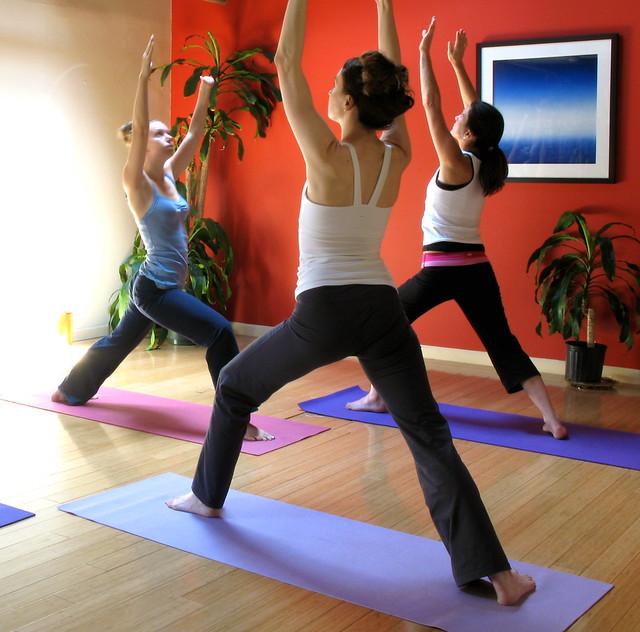Chapter 1 Adult Learner Awareness
1.5 Personal Wellness

Personal wellness means being physically, emotionally, mentally, and spiritually healthy. A healthy lifestyle helps balance all these aspects to achieve wellness. Your decisions and choices will impact both your short-term and long-term wellness. It is important to take into account your overall personal wellness in order to increase the potential for academic success in your educational program and get the greatest benefit out of it. In this section you will learn about some of the various aspects affecting your wellness, such as nutrition, fitness and lifestyle choices. You will assess your personal wellness and identify goals for improvement.
Physical Health

There are many lifestyle choices that we make that impact our personal wellness; negative choices can become vices and cause addictions that can impede wellness for a few hours or lifelong, as well as positive choices which can promote health and help form healthy habits. Some of the most rudimentary lifestyle choices are choosing to nurture and protect your body.
- Get enough sleep every night and try to be consistent about your sleeping routine. Studies show this helps your brain function more effectively.
- Keep hydrated. Drink plenty of water throughout the day. Avoid pop, alcohol, and sugary drinks.
- Eat a balanced, nutritious diet. Good nutritious food and a well-balanced diet will fuel your body. Avoid junk food and processed food.
- Exercise regularly and stay fit.
- Keep alcohol intake reasonable. Over-consumption of alcohol reduces the ability to function efficiently or think clearly. It can cause devastating accidents. It can lead to alcoholism, which can destroy families and relationships, and can eventually lead to liver failure and death.
- Don’t smoke! It causes lung cancer, emphysema, chronic cough, shortness of breath, and dull skin, and it causes you to smell bad.
- Be cautious about vaping. New information is coming out connecting vaping with serious lung diseases. It is also causing nicotine addictions in young people. Be cautious until more information is known about the causes.
- Don’t do non-pharmaceutical drugs. They mess with your body’s ability to do its job, and can cause addiction.
- Avoid harmful habits that can take over your life. Gambling can ruin a family’s finances. Sexual addictions can ruin relationships, and unguarded promiscuity can result in unwanted sexually transmitted infections (STI’s) or unwanted pregnancies.
- Follow safety rules. Buckle up. Wear your helmet. Use ladders carefully. Wear safety googles, gloves and other protective equipment when required. These choices will help prevent unnecessary accidents that can have serious long-term effects.
- Spend time outdoors and get fresh air and sunshine. Fresh air and sunshine help give the body vitality and vitamin D, which provides numerous benefits.
- Stay active. Keep moving. Go for walks. Take the stairs instead of the elevator. Ride your bike.
- Stay home when you are sick. Rest. It allows your body to fight and recover from illness, and keeps others safe. No one wants your illness, so stay home from work or school.
- Be cautious about cell phone proximity. Cell phone manufacturers recommend keeping your phone at least 5-15 mm away from your body. There are concerns about the dangers of radiation exposure, though the findings are inconclusive. If interested, see the CBC Marketplace video: The secret inside your cellphone.
- Keep current about newly discovered health dangers. Are you aware of any health dangers you didn’t know about before?

Emotional Health
As well as looking after your physical health, it’s also important to look after your emotional health. Emotional health keeps your heart in check, and helps you to keep your emotions reasonable. Here are some ways to stay emotionally healthy.
- Don’t hold onto grudges. It helps to keep bitterness out of your heart.
- Do things that bring you peace. Maybe that’s going for a nature walk or a hike in the forest.
- Visit family and friends. Get together with people you care about. This is always good for the heart. There is nothing like talking to a good friend and feeling known and understood.
- Join a team. Go curling or play recreational soccer. Meet new people while you learn a new skill and keep active.
- Have some down time. Sometimes it just feels good to let things go and watch a good movie. Rest, relax, cry, laugh and enjoy.
- Be aware of your feelings and attitudes. Accept them and acknowledge your thoughts. Use positive self-talk.
- Develop your self-esteem. Pursue things that matter to you. Get good at things that you care about. Give to causes that matter to you. Volunteer. These will help you feel good about yourself because you will feel like you are part of something important and are making a valuable contribution to the world.
- Make work count. Using your gifts, skills and talents helps work be fulfilling and meaningful.

Mental Health
Your mental health can be impacted by hormonal or chemical imbalances, circumstances, and lifestyle. This is a complicated issue, and in cases of serious depression, anxiety, and other mental health issues, it is important to get medical help through a doctor, counsellor, psychiatrist, or other health professional. But everyone, no matter what level of mental health, needs to keep stock of their mental health. Keeping in a state of wellness can be helped by using these strategies:

- Eat well.
- Sleep well and keep a consistent schedule.
- Exercise. Staying active is good for your mental wellness.
- Socialize. Often when people struggle with mental health issues, they are tempted to lock themselves away from others, but this can often cause things to spiral downwards and get worse. Get together with people who make you feel good. Develop and strengthen relationships and enjoy a sense of belonging.
- Meditate. Sometimes meditating on positive things helps provide a concentrated focus which can improve mental wellness.
- Keep informed. Learn. Educate yourself about your condition, and stay abreast of common discoveries in the field.
- Support groups. Support groups bring together people of common mind and problems. They support and encourage each other and provide accountability. People are checking up on you to see that you are staying on track.
- Trust someone. Share with a friend. Have a confidante.
- Avoid destructive influences. Avoid websites which specifically exist to humiliate, berate, and degrade people. Yes, they exist, and they are toxic for your mental health.
- Take action. Make a decision to take action in ways that seem to be working for you. Be consistent in your plan.
- Stay sharp. Challenge yourself intellectually and continually learn new things. Be active and purposeful about lifelong learning.
- Try new things. Engage in creative and stimulating activities.
Spiritual Health
As well as looking after your physical, emotional, and mental health, you also need to look after your spiritual health. Your spirit is the deepest part of you – the part that makes you you. Spirituality is different for everyone. It is what provides you with meaning and purpose in your life. Your faith, values, beliefs, principles, and morals define your spirituality. For some, spirituality is nurtured through traditional religions, while for others it comes through relationships or being at peace with nature. Spiritual wellness brings inner peace, strength and hope. There are a number of ways to achieve spiritual wellness depending on your beliefs.

- Align your actions with your beliefs. There is nothing that can cause internal turmoil more than when your actions are in conflict with your moral standards. Stand up for what you believe. Being at peace within will nurture your spiritual health.

Mountainside Community Church in Fernie BC - Nurture your faith. Go to church, a bible study, a spiritual home group, or a worship service.
- Pray. If you believe in a god or higher power (or even if you’re not sure if you do), take time to pray, talk, adore, communicate, beseech, ask, learn from, and listen to your god or higher power.
- Meditate. Take time to focus on things that matter to you.
- Reflect. Reflect on your experiences – both the joyful and the difficult ones. What did you learn from them? Can you grow from them?
- Read. Read your Bible, Quran, The Book of Mormon, or whatever your book of faith is. It may be a self-help book, an Alcoholics-Anonymous book, a Celebrate Recovery book, or a book on healing relationships. Read things that feed your spirit.
- Sing or play. If you can sing, sing your heart out to express yourself, express thankfulness, worship your god – communicate your inner feelings and thoughts. Or play a musical instrument to communicate your heart and your mood. There is something inherently profound about expressing yourself through music.
- Forgive. Practising forgiveness protects your heart from anger and bitterness.
- Enjoy nature. Take a walk in the forest, or along a river. Listen to the birds sing, or watch the chipmunks play.
- Give. Volunteer. Give to your community. Be a mentor. Focusing on others instead of yourself can bring great fulfillment.
- Clarify meaning and purpose. Know what matters to you. Define your values and beliefs. Be purposeful.
What are some other ways you develop your spiritual health?

Aspects of Personal Wellness
Of course, in many of these aspects of personal wellness (physical, emotional, mental, spiritual) everyone will veer from good habits at least every now and then. But it’s good to keep them in check and be conscious of the impact of the lifestyle choices you are making. Too much of anything can become a destructive force in your life. Do you spend too much time on your cell phone, watching TV, on social media, on the internet, or playing video games? Is there something you do in your life that you know you should scale back on?
Reflections of a Former Student: Positive and Negative Influences

Peers
One of the most difficult things to come to terms with regarding your personal well-being is the people you spend time with. Many of us choose our friends based simply on who makes us feel the most comfortable, but being comfortable with a bad situation can be a negative thing in the long term. While close bonds with your friends are extremely important, it’s also vital to evaluate every once in a while: Do the people I spend time with uplift me? Do they reinforce habits, behaviours, and thought patterns that better my well-being, or are they holding me back? This isn’t as simple as spending time with only “positive” people with nice things to say to you. This is about finding people who are willing to challenge your weaknesses and push you to succeed on your own terms, while also being aware of your emotional needs. Finding this balance is incredibly difficult, and letting go of unhealthy relationships can be one of the hardest things we’ll ever have to do in life.
Media
Furthermore, in the modern world, this goes beyond just the people we give our time to, but also extends to our relationships with the various media we consume. Ask yourself, do you have a tendency to always engage with dark and violent movies, or depressing music? These things aren’t inherently bad to enjoy, and can be a healthy emotional outlet during the times when we deal with our own dark emotions, but media consumption can be thought of like a diet, and needs to be balanced as such. The emotional connection we get from media can become addictive, and if you find yourself always coming back to media that puts you in a depressed or angry state of mind, try integrating a little more variety into your media diet. By no means does this mean abandoning your personal taste for horror movies, for example, but once in a while try to throw on a good rom-com, and engage with it emotionally rather than judgmentally. Contrast the experiences you have with different media, and you will have a fuller experience with your engagement as a whole. It may even make you appreciate your old favourites in a whole new light!
— Gordon Shier, illustrator and animator
What you’re doing now in terms of personal health will have a significant influence on your academic performance. Setting healthy habits early on will improve both your academic performance and long-term health.
Considerable research has demonstrated that the basic elements of good health—nutrition, exercise, not abusing substances, stress reduction—are important for preventing cardiovascular diseases, diabetes, cancers, and chronic respiratory diseases, known to be the causes of nearly two thirds of deaths worldwide [1]. The key risk factors for these non-communicable diseases are high blood pressure, smoking, high BMIs, low physical activity levels, alcohol consumption, and poor diet.
Wellness is more than just avoiding disease, however. Wellness involves feeling good in every respect – in mind and spirit as well as in body. Good health habits also offer the benefits of increased energy; better focus; less stress; more resilience; less lost time due to colds, flu, infections and other illnesses; more restful sleep; and improved mental health.
This video from the Centres for Disease Control and Prevention introduces the positive benefits exercise has on health including disease prevention, longevity, weight control, and better sleep. It also explains aerobic activity and muscle strength training.
Video: “Physical Activity Guidelines” (length 4:42)
https://www.youtube.com/watch?v=lEutFrar1dI
It’s also interesting to note how different dimensions of health affect each other. Physical health can impact emotional health and mental health.
Video: “Exercise and the Brain” (length 4:18)
This neuroscientist, Wendy Suzuki, explains the positive impact exercise has on memory, learning, mood and health. In fact, it highlights the brain-changing effects of exercise in this fascinating Ted Talk.
Video: “The Brain-changing Effects of Exercise | Wendy Suzuki” (length 13:03)
The next video talks about the effects exercise has on mental wellness for students.
Video: “Exercise and Mental Health” (length 3:35)
Exercise: Personal Wellness
Consider the various aspects of personal wellness and health (physical, emotional, mental, spiritual) listed in this unit and take an inventory of your own wellness. In what ways are you doing well? What ways could use improvement? Can you set some short and long term goals for your personal wellness?
Your report should be approximately one page.

One activity can contribute to many aspects of personal wellness. An outing such as hiking incorporates physical exercise, fresh air, social time with friends, and time of contemplation in nature.
Text Attributions
- This chapter was adapted from “Personal Wellness” from the EDCP Career Planning Open Course by Mary Shier. CC BY.
- The second, third, and fourth paragraphs under the “Aspects of Personal Wellness” heading are from “Physical and Mental Health” in Strategies for Academic Success by Liv Marken. Adapted by Mary Shier. CC BY-NC-SA.
Video Attributions
- Physical Activity Guidelines – Introduction by Centers for Disease Control and Prevention. Standard YouTube licence.
- Exercise and the Brain by Demystifying Medicine. Standard YouTube Licence.
- The brain-changing benefits of exercise | Wendy Suzuki by Ted. Standard YouTube licence.
- Exercise and Mental Health by Demystifying Medicine. Standard YouTube Licence.
Media Attributions
- Weight Loss Yoga Synergy © Jasmine Kaloudis is licensed under a CC BY-ND (Attribution NoDerivatives) license
- Children Playing © Clker-Free-Vector-Images, pixabay is licensed under a Public Domain license
- Spiritual © Free photos, pixabay is licensed under a Public Domain license
- Praying © waldryano, pixabay is licensed under a Public Domain license
- Faith, love, hope © geralt, pixabay is licensed under a Public Domain (No Rights Reserved) license
- Gordon Shier © Mary Shier is licensed under a CC BY (Attribution) license
- Hiking Goldilocks July 2019 © Mary Shier is licensed under a CC BY (Attribution) license
- The National Center for Chronic Disease Prevention and Health Promotion, Center for Disease Control and Prevention, 2014, https://doi.org/10.1016/S0140-6736(14)60648-6 ↵

